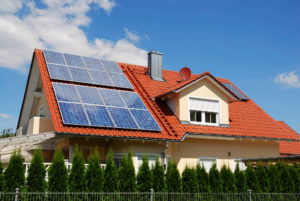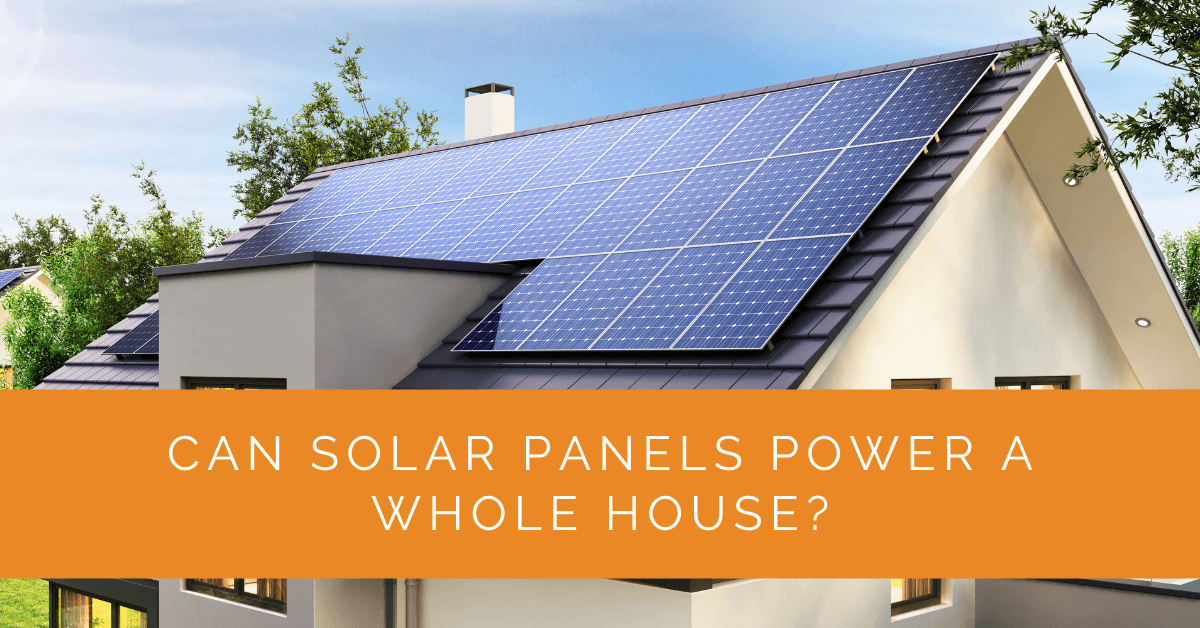As interest in renewable energy grows, many homeowners wonder if solar panels can power their houses. In this article, we will delve into the details of solar power and explore whether it can effectively meet the energy needs of a whole house. From system sizing to financial considerations, we’ll provide the information you need to decide about powering your home with solar energy.
Contents
- 1 Key Takeaways
- 2 Understanding Solar Power Basics
- 3 Sizing a Solar Panel System
- 4 Evaluating Solar Panel Output
- 5 Meeting Household Energy Demands
- 6 Solar Power Limitations
- 7 Financial Considerations and Incentives
- 8 Case Study: How Solar Panels Network USA Successfully Powered a Whole House
- 9 Expert Insights From Our Solar Panel Installers About Solar Panels Powering a Whole House
- 10 Experience Solar Excellence with Us!
- 11 Conclusion
Key Takeaways
- Solar panels have the potential to power a whole house by generating electricity through the photovoltaic effect and utilizing net metering to maintain a reliable power supply.
- Sizing the solar panel system according to household energy consumption, evaluating solar panel output based on efficiency and sunlight availability, and balancing energy supply and demand.
- While solar power has limitations due to seasonal variations and nighttime reliance, advancements in technology, energy storage systems, and government incentives make solar panels a viable and cost-effective solution for powering your entire home.
Understanding Solar Power Basics
How Solar Panels Generate Electricity
Solar panels harness the abundant energy from the sun through the photovoltaic effect. When sunlight strikes the solar cells within the panels, it excites electrons, creating a flow of direct current (DC) electricity. This clean, renewable energy source provides a sustainable solution to our power needs.
Net Metering and Grid Connection
In addition to generating electricity, solar panel systems are often connected to the grid through net metering. This enables homeowners to feed excess electricity back into the grid, earning credits that can be used when their solar panels are not producing enough power. Grid connection ensures a reliable and consistent power supply, offering peace of mind even during periods of low solar production.
Sizing a Solar Panel System
Determining Household Energy Consumption
To accurately size a solar panel system for your home, evaluating your household’s energy consumption is crucial. Consider your historical electricity bills and identify energy-intensive appliances and devices. This analysis will provide valuable insights into your average energy usage, allowing you to determine the appropriate system size needed to power your entire home.
Calculating Solar Panel System Size
Several factors come into play when calculating the size of your solar panel system. Location plays a vital role, as regions with greater sunlight exposure require fewer panels to generate the desired energy output. Roof space availability is another consideration, as it determines the maximum number of solar panels you can install. Additionally, the solar panels’ efficiency influences the number of panels needed to generate a specific amount of electricity. By carefully considering these factors, you can determine the optimal number of solar panels to power your home.
Evaluating Solar Panel Output
Solar Panel Efficiency
Solar panel efficiency refers to the ability of the panels to convert sunlight into usable electricity. Higher efficiency panels capture more sunlight and generate more power per square meter. When evaluating solar panels for your system, consider their efficiency ratings and choose panels that balance cost-effectiveness and power output.
Considering Sunlight Availability
The amount of sunlight available at your location directly impacts the output of your solar panel system. Factors such as shading from nearby buildings or trees, the orientation of your roof, and the tilt angle of the panels can affect the overall system performance. Evaluating sunlight availability throughout the year is essential to optimize the placement of your solar panels and maximize energy production.

Meeting Household Energy Demands
Balancing Energy Supply and Demand
To power your entire home with solar energy, it is crucial to balance energy supply and demand. A properly sized solar panel system should generate enough electricity to meet your household’s energy consumption throughout the day. Energy storage systems, such as batteries, can be integrated to store excess energy for use during periods of low solar production, ensuring a consistent power supply.
The Importance of Energy Efficiency
Maximizing energy efficiency within your home is key to reducing overall energy consumption and optimizing the effectiveness of your solar panel system. Replace outdated appliances with energy-efficient models, improve insulation, and adopt energy-conscious habits such as turning off lights when not in use. By reducing your electricity usage, you can maximize the percentage of power your solar panels provide, potentially eliminating or significantly reducing your reliance on the grid.
Solar Power Limitations
Seasonal and Weather Variations
Solar panel output can vary due to seasonal changes and weather conditions. Solar production may be lower during winter or in regions with frequent cloud cover compared to sunnier months. However, it is important to note that solar panels can still generate electricity under suboptimal conditions. Technological advances and improved panel efficiency have minimized the impact of seasonal variations, making solar power a viable solution throughout the year.
Nighttime and Off-Grid Considerations
Solar panels solely generate electricity during daylight hours. When solar production ceases at night, you will rely on stored energy or draw power from the grid. Energy storage systems, such as batteries, provide a solution for storing excess solar energy generated during the day, allowing you to use it during nighttime. Off-grid solar installations, where the home is not connected to the utility grid, require larger storage capacities and backup power sources to ensure an uninterrupted electricity supply. These considerations are crucial when determining if solar panels can fully power your home, especially during periods without sunlight.
Financial Considerations and Incentives
Cost Analysis of Solar Panel Systems
The cost of installing a solar panel system should be evaluated regarding upfront expenses and long-term savings. While the initial investment may seem significant, consider the potential reduction or elimination of monthly electricity bills over the system’s lifespan. By offsetting or eliminating your reliance on the grid, solar panels can lead to substantial financial savings in the long run. It is important to perform a comprehensive cost analysis that factors in the system’s installation, maintenance, and potential return on investment (ROI).
Government Incentives and Rebates
To encourage the adoption of solar energy, many governments provide incentives and rebates to homeowners who choose to go solar. These financial incentives can significantly offset the initial installation costs, making solar panel systems more affordable and accessible. Federal and local programs, such as tax credits, grants, and renewable energy certificates (RECs), help reduce the overall expense of going solar and increase the ROI of your solar panel investment. Research your area’s available incentives and rebates to take full advantage of these cost-saving opportunities.
Case Study: How Solar Panels Network USA Successfully Powered a Whole House
Background
Our client, a homeowner in a suburban area, approached Solar Panels Network USA with the goal of transitioning their home to be entirely powered by solar energy. The client had a strong interest in reducing their carbon footprint and long-term energy costs.
Project Overview
The project began with a thorough assessment of the client’s energy consumption patterns. This included reviewing historical electricity bills and identifying key energy-intensive appliances. We also evaluated the roof space and orientation to determine the best placement for the solar panels.
Implementation
- System Design: We installed a high-efficiency solar panel system designed to meet the household’s average daily energy usage.
- Panel Selection: The system included a mix of photovoltaic panels with high-efficiency ratings.
- Battery Storage: An advanced battery storage system was integrated to store excess energy generated during peak sunlight hours.
- Seamless Transition: Our team streamlined the installation process to maintain a seamless transition from grid power to solar power.
- Component Mapping: We mapped out the relationship between different components (panels, inverters, batteries) to enhance overall system efficiency.
Results
- Energy Production: The client reported a significant reduction in electricity bills, with the solar system generating approximately 90% of their total energy needs.
- Nighttime Power: The battery storage system provided reliable power during nighttime.
- Net Metering: The net metering setup allowed the client to earn credits during periods of excess production.
- Financial Incentives: The project benefited from several government incentives, significantly reducing the upfront costs.
Summary
This case study demonstrates the feasibility and benefits of powering a whole house with solar energy. By carefully assessing energy needs, leveraging advanced technology, and taking advantage of financial incentives, Solar Panels Network USA successfully transitioned a suburban home to solar power. The project not only provided substantial cost savings but also contributed to a more sustainable lifestyle for the homeowner. Our approach highlights the importance of detailed planning and the effective use of modern solar solutions in achieving energy independence.
Expert Insights From Our Solar Panel Installers About Solar Panels Powering a Whole House
Properly sizing your solar panel system is key to ensuring that your home can be fully powered by solar energy. By evaluating your household’s energy consumption and factoring in the efficiency of the panels, you can achieve a setup that meets your needs year-round.
Senior Solar Technician
Advancements in solar technology and energy storage systems have made it more feasible than ever to rely entirely on solar power. Even in areas with less sunlight, efficient panels and batteries can bridge the gap, ensuring a reliable power supply.
Lead Solar Installer
Government incentives and rebates are substantial. They not only reduce the initial investment but also make the transition to solar power more financially viable. It’s worth exploring all available programs to maximize your savings.
Solar Energy Consultant
Experience Solar Excellence with Us!
Trust in Solar Panels Network USA, where our seasoned experts deliver top-quality solar solutions for homes and businesses nationwide. With a legacy of countless successful installations and a commitment to sustainable energy, we’re your reliable partner in the solar journey. Ready for a brighter, eco-friendly future? Call us now at (855) 427-0058 and harness the power of the sun!
Conclusion
Solar panels have the potential to power a whole house, provided that the solar panel system is properly sized to meet your energy demands. Factors such as system sizing, solar panel efficiency, sunlight availability, energy storage, and energy efficiency in your home play crucial roles in determining whether solar panels can effectively power your entire home. By evaluating your energy consumption, considering local conditions, and consulting with solar professionals, you can make an informed decision about the number of solar panels you need and the viability of a solar installation to power your entire home.
Embracing solar power reduces your reliance on fossil fuels and offers long-term financial and environmental benefits. A properly designed and well-maintained solar panel system can significantly reduce your electricity costs while contributing to a sustainable future. Power your home with the clean and renewable energy of the sun, and take a step towards a greener and more energy-efficient lifestyle.
About the Author
Solar Panels Network USA stands at the forefront of solar energy solutions, driven by a team of seasoned solar engineers and energy consultants. With over decades of experience in delivering high-quality solar installations and maintenance, we are committed to promoting sustainable energy through customer-centric, tailored solutions. Our articles reflect this commitment, crafted collaboratively by experts to provide accurate, up-to-date insights into solar technology, ensuring our readers are well-informed and empowered in their solar energy decisions.

